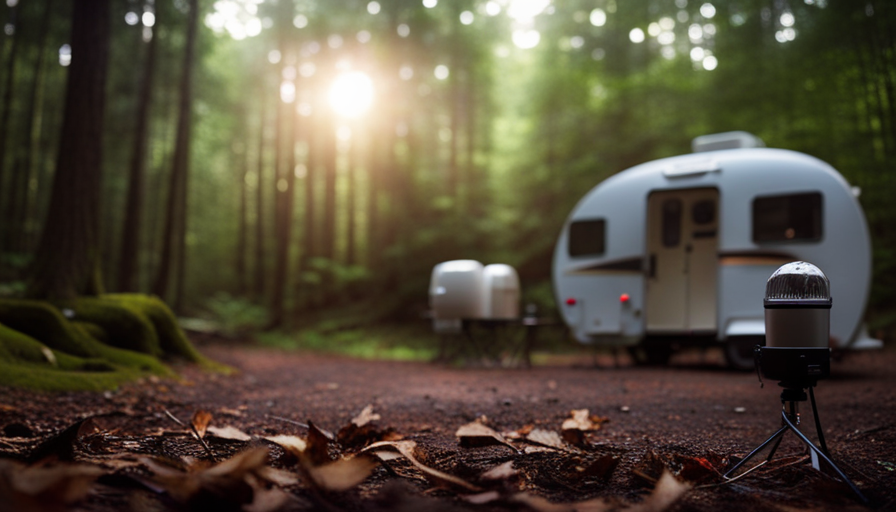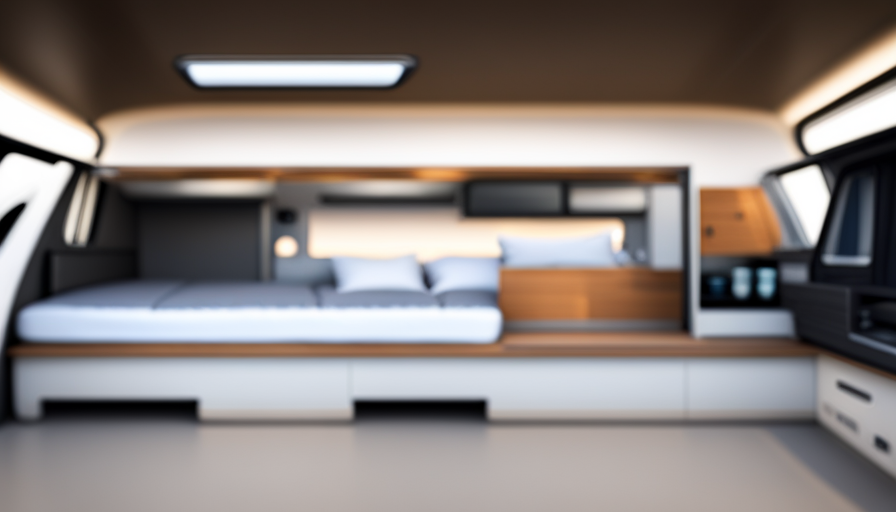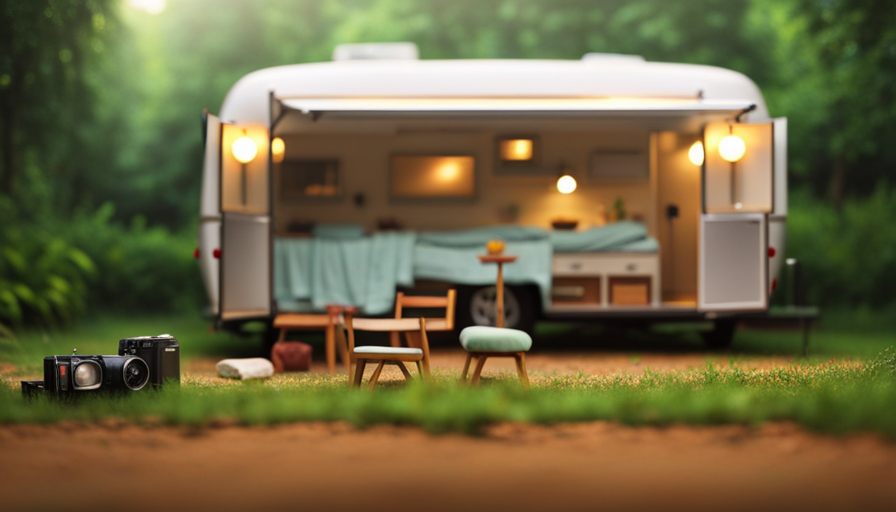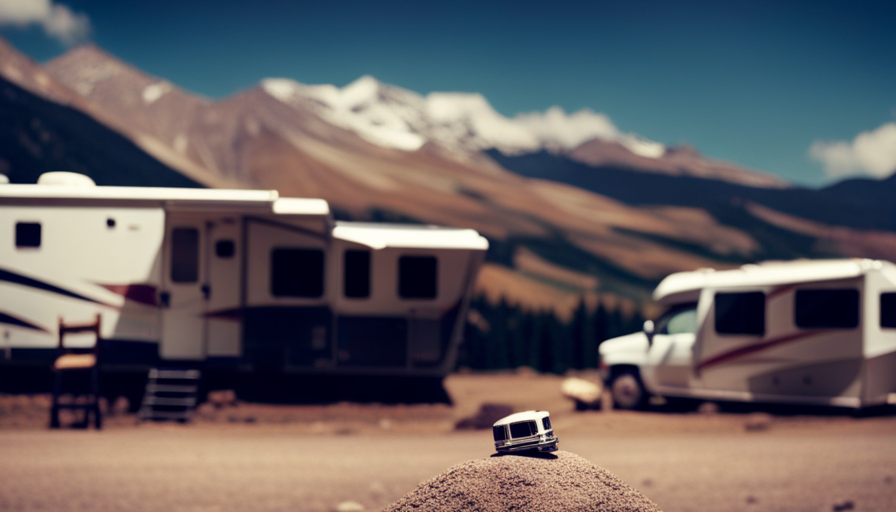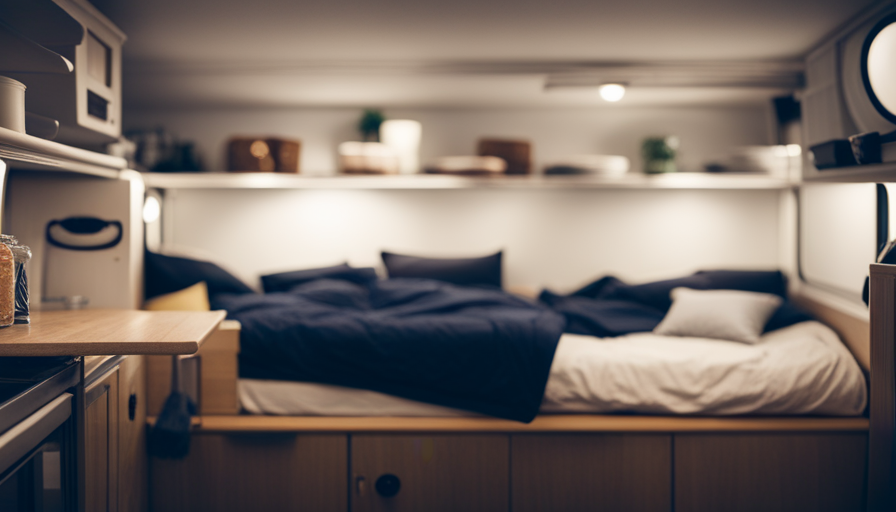Are you prepared to embark on your camper adventure but uncertain about the generator size needed to power your trip? Fear not! In this article, we will assist you in selecting the ideal generator size for your camper.
As they say, ‘size matters,’ and when it comes to generators, it couldn’t be more true. By assessing your power needs, considering your camper’s power source, and calculating the required wattage, you’ll be well on your way to finding the ideal generator size.
But that’s not all! We’ll also help you evaluate run time and fuel efficiency, look for safety features, and consider your budget and long-term value. And don’t worry if you’re feeling overwhelmed – we’ve got your back!
So let’s dive in and find the generator that will keep your camper powered up and ready for any adventure that comes your way.
Key Takeaways
- Assess the power needs of your camper by making a list of appliances and their power ratings
- Consider startup or surge power when calculating power requirements
- Choose a generator that is compatible with your camper’s power source
- Prioritize appliances with higher power needs and consider noise levels when selecting a generator
Assess Your Power Needs
Assessing our power needs is essential in determining the right size of generator for our camper, so we can fully enjoy our adventures without any worries! To accurately determine the power requirements of our camper, we need to consider the electrical appliances we plan to use.
Start by making a list of all the appliances that will be powered by the generator. Include items such as the refrigerator, air conditioner, microwave, and any other devices you plan to bring along.
Next, find the power rating for each appliance. This information is typically located on the appliance itself or in the owner’s manual. The power rating is measured in watts and represents the amount of power the appliance will consume when running. Add up the power ratings of all the appliances to get the total power requirement.
Keep in mind that some appliances may have a higher power requirement when they first start up. This is known as the startup or surge power. Make sure to account for this when calculating your power needs.
Once you have determined the power requirements, you can then choose a generator that can handle the load. Consider your camper’s power source and ensure that the generator you choose is compatible.
With this information in hand, you can confidently select the right size of generator for your camper and embark on your adventures with peace of mind.
Consider Your Camper’s Power Source
Considering your camper’s power source can greatly enhance your camping experience. When determining the size of generator you need for your camper, it’s important to take into account the battery power and the use of solar panels.
The battery power in your camper plays a crucial role in providing electricity for various appliances and devices. It’s essential to know the capacity of your camper’s battery and how long it can supply power before needing to be recharged. This information will help you determine the size of generator needed to recharge the battery efficiently during your camping trips.
Solar panels are another power source option for campers. They harness energy from the sun and convert it into electricity, which can then be used to power your camper. When considering solar panels, it’s important to evaluate your energy needs and the size of the solar panel system required to meet those needs. This will help you determine if a generator is necessary and what size would be most suitable.
Understanding your camper’s power source, including the battery power and the use of solar panels, is crucial when determining the size of generator you need. By considering these factors, you can ensure that your camping experience is powered efficiently and effectively.
Now, let’s move on to determining the type of generator that best suits your needs.
Determine the Type of Generator
Once you’ve got your camper’s power source figured out, it’s time to pinpoint the perfect type of generator for your needs, so you can keep the current flowing and the adventure going.
Assessing power consumption and understanding power source compatibility are crucial steps in this process. First, assess your power consumption by making a list of all the electrical devices you plan to use in your camper. Consider the wattage of each device and estimate the number of hours you’ll be using them per day. This will give you an idea of how much power you’ll need.
Next, you need to understand the compatibility between your camper’s power source and the generator. Some campers are designed to be compatible with specific types of generators, such as solar-powered or propane-powered ones. It’s important to choose a generator that complements your camper’s power source to ensure optimal performance.
With your power consumption assessed and power source compatibility understood, you can now move on to calculating the required wattage for your generator. This will help you determine the appropriate size and capacity of the generator that’ll meet your power needs. By taking these factors into consideration, you can confidently select the right generator for your camper and enjoy a worry-free adventure.
Calculate the Required Wattage
When calculating the required wattage for a generator, we need to determine the starting and running wattage of our appliances and electronics. This information is crucial as it helps us understand the power demand of each item and ensures we choose a generator with sufficient capacity.
Once we have the wattage for each device, we can simply add them up to find the total power output needed from the generator.
Determine the starting and running wattage of your appliances and electronics
To accurately determine the size of generator you need for your camper, it’s crucial to know the starting and running wattage of all your appliances and electronics. This will help you determine power requirements and calculate energy consumption.
Starting wattage refers to the amount of power needed to start an appliance, while running wattage is the power needed to keep it running. To find this information, consult the appliance manuals or search online. Keep in mind that some appliances, like air conditioners or refrigerators, may have a higher starting wattage compared to their running wattage.
Once you have gathered this data, you can add up the wattage to find the total power output needed from the generator. By knowing these values, you can ensure that your generator is capable of handling the demands of your camper’s appliances and electronics.
Add up the wattage to find the total power output needed from the generator
Calculating the total power output required from the generator can ensure that all your appliances and electronics in the camper are powered adequately. To determine the generator size needed, you must calculate the power usage of each appliance and electronic device that will be running simultaneously.
Start by listing all the appliances and electronics you plan to use and find their starting and running wattage. Add up the wattage of all the items to find the total power output needed from the generator.
This calculation will help you choose the right size generator that can handle the load and prevent any power shortages. By accurately determining the generator size, you can ensure that your camper will have sufficient power for all your needs.
So, let’s move on to the next section and learn how to choose the right size without any guesswork.
Choose the Right Size
Choosing the right size generator for your camper is crucial. It is important to consider the power output when making your decision. A generator that is too small may not be able to handle the load and can cause damage to your appliances. On the other hand, a generator that is too large can result in wasted fuel and increased noise levels.
To choose the right size, carefully analyze the power needs of your camper. Prioritize the appliances that require the most power and determine the minimum power output required for your generator. Remember to account for start-up power requirements, as some appliances may have higher power demands when first turned on.
In addition to power output, consider noise levels when selecting a generator. It is important to choose one that operates quietly to ensure a peaceful camping experience.
By choosing a generator with the appropriate power output and considering noise levels, you can enjoy your camping trip without any power interruptions or excessive noise.
Consider Noise Levels
When considering noise levels for a camper generator, it’s important to check the decibel rating. This will ensure a quiet camping experience. Look for generators that have noise-reducing features to minimize disturbance to yourself and others around you. By choosing a generator with a lower decibel rating and noise-reducing features, you can enjoy a peaceful camping trip without the constant noise of a loud generator.
Check the decibel rating to ensure a quiet camping experience
Make sure to check the decibel rating of the generator for a peaceful camping experience.
When choosing a generator for your camper, it’s important to consider noise levels. Camping should be a tranquil and relaxing experience, and the last thing you want is a noisy generator disrupting the serenity of nature.
The decibel rating indicates the amount of noise the generator produces. Look for generators with lower decibel ratings, as they’ll be quieter and less likely to disturb you or your fellow campers.
Additionally, some generators come with noise-reducing features that further minimize noise output. These features may include soundproofing materials or mufflers. By selecting a generator with a low decibel rating and noise-reducing features, you can ensure a more peaceful camping experience.
Look for generators with noise-reducing features
To truly embrace the zen of camping, seek out generators that come equipped with noise-reducing features, allowing you to bask in the soothing sounds of nature without any pesky interruptions.
Here are three reasons why noise reducing technology is a must-have for a peaceful camping experience:
-
Enhanced relaxation: With noise reducing technology, you can enjoy the tranquility of the great outdoors without the constant hum of a loud generator. This creates a more serene and calming environment, perfect for unwinding and connecting with nature.
-
Considerate camping: Portable and lightweight options with noise reducing features are designed to be considerate towards fellow campers. You won’t disturb others with excessive noise, ensuring a harmonious camping experience for everyone.
-
Compliance with campground regulations: Many campgrounds have strict noise regulations in place to preserve the natural ambiance. Choosing a generator with noise reducing technology helps you stay within these guidelines, avoiding any potential fines or conflicts.
In the next section, we will evaluate run time and fuel efficiency, essential factors to consider when selecting the right generator for your camper.
Evaluate Run Time and Fuel Efficiency
To determine the perfect generator size for your camper, imagine the satisfaction of having a generator that offers impressive run time and fuel efficiency. When evaluating run time and fuel efficiency, it’s important to consider fuel consumption and generator maintenance.
Fuel consumption refers to the amount of fuel the generator consumes per hour of operation. A generator with low fuel consumption will allow you to maximize your camping experience without constantly refueling. Additionally, consider the generator’s maintenance requirements as this can affect its overall efficiency. Generators that require frequent maintenance may not be as fuel efficient in the long run.
To ensure optimal run time and fuel efficiency, look for generators that are designed with features such as automatic fuel shutoff and idle control. These features help regulate fuel consumption by automatically adjusting the generator’s speed based on the power demand. This not only saves fuel but also reduces noise and engine wear. Additionally, consider generators with smart fuel gauges that provide accurate readings of the remaining fuel, allowing you to plan accordingly.
Evaluating run time and fuel efficiency is crucial when determining the size of generator for your camper. By considering factors such as fuel consumption and maintenance requirements, you can select a generator that offers excellent performance and helps you make the most of your camping experience.
Now, let’s explore the next step: look for safety features.
Look for Safety Features
When considering a generator for our camper, it’s crucial to prioritize safety features. We should look for key features such as low-oil shutoff and overload protection to prevent any potential hazards.
Additionally, it’s essential to ensure that the generator is compliant with safety regulations to guarantee the well-being of both ourselves and our fellow campers.
Check for features like low-oil shutoff and overload protection
Ensure your generator for your camper possesses practical perks such as low-oil shutoff and overload protection. These features are crucial for the safe and efficient operation of your generator.
The low-oil shutoff feature automatically turns off the generator when the oil level is too low, preventing damage to the engine. This prevents costly repairs and ensures the longevity of your generator.
Additionally, overload protection is essential as it safeguards the generator from excessive electrical load. It automatically shuts off the generator when the load exceeds its capacity, preventing any potential damage to your appliances or the generator itself.
By having these safety features in place, you can have peace of mind knowing that your generator will operate smoothly and protect your camper’s electrical system.
Moving forward, it’s important to ensure the generator is compliant with safety regulations.
Ensure the generator is compliant with safety regulations
Make sure your generator meets all safety regulations to ensure a worry-free camping experience. When assessing noise levels, it’s important to choose a generator that operates quietly, so as not to disturb your camping neighbors. Look for generators with noise levels below 60 decibels, as these are considered to be the most quiet and won’t disrupt the peacefulness of your surroundings.
Additionally, evaluating fuel efficiency is crucial to minimize fuel consumption and maximize the runtime of your generator. Look for models that offer a longer runtime per gallon of fuel, as this’ll allow you to enjoy your camping trip without constantly refilling the tank.
Ensuring your generator is compliant with safety regulations, while also considering noise levels and fuel efficiency, will help you find the perfect generator for your camper. This’ll guarantee a worry-free camping experience, allowing you to focus on enjoying the great outdoors.
Now, let’s consider budget and long-term value.
Consider Budget and Long-Term Value
When considering the budget and long-term value of a generator for our camper, we need to compare prices and take into account the generator’s durability. It’s important to invest in a generator that will last for many years and provide reliable power during our camping trips.
Additionally, evaluating the warranty and customer reviews can give us an idea of the generator’s quality and the level of customer satisfaction.
Compare prices and consider the long-term durability of the generator
Consider the long-term durability and compare prices of generators that’ll suit your camper’s needs.
When comparing prices, it’s essential to also consider the long-term durability of the generator. This means analyzing the construction quality and materials used to ensure it’ll withstand the test of time.
Additionally, comparing fuel options is crucial. Some generators run on gasoline, while others use propane or diesel.
Analyzing portability options is another factor to consider. Will the generator be easy to transport and store when not in use?
These aspects will help determine the overall value and longevity of the generator. Evaluating the warranty and customer reviews will provide further insight into the reliability and customer satisfaction with the product.
Transitioning into the next section, it’s important to thoroughly evaluate these aspects before making a decision.
Evaluate the warranty and customer reviews
After comparing prices and considering the long-term durability of the generator, it’s important to evaluate the warranty and customer reviews.
When evaluating warranty coverage, look for a generator that offers comprehensive protection for a reasonable amount of time. This will ensure that any potential issues with the generator can be addressed without incurring additional costs.
Additionally, consider customer satisfaction by reading reviews from other camper owners who have purchased and used the generator. Their experiences can provide valuable insights into the generator’s performance and reliability. Look for reviews that highlight the generator’s ability to meet the power needs of a camper and its overall durability.
By evaluating warranty coverage and considering customer satisfaction, you can make an informed decision about which generator is best for your camper.
Now, let’s move on to seeking expert advice on selecting the right generator.
Seek Expert Advice
When considering what size of generator you need for your camper, it’s crucial to seek expert advice. Consulting with experienced campers or RV enthusiasts can provide valuable recommendations based on their own experiences.
Additionally, visiting a reputable dealer or contacting manufacturers directly can offer guidance and expertise on the best generator options for your specific camper.
Consult with experienced campers or RV enthusiasts for recommendations
To get the best advice on what size generator you need for your camper, why not chat with experienced campers or RV enthusiasts? These individuals have firsthand knowledge and can provide valuable insights into power requirements and generator options.
Their experiences with different models and setups can help you make an informed decision. You can ask about the wattage needed to run essential appliances, such as air conditioners, refrigerators, and microwaves. They can also offer tips on fuel efficiency and noise levels, which are crucial considerations for a generator.
Gathering information from experienced campers or RV enthusiasts will give you a better understanding of what size generator will best suit your needs. Once you have their recommendations, you can visit a reputable dealer or contact manufacturers for guidance on specific models and technical specifications.
Visit a reputable dealer or contact manufacturers for guidance
Don’t hesitate to reach out to reputable dealers or the manufacturers themselves for expert guidance on finding the perfect power solution for your outdoor adventures. When it comes to selecting the right generator size for your camper, visiting a reputable dealer or contacting the manufacturers directly can provide valuable insights and recommendations.
Reputable dealers have extensive knowledge and experience in the field, allowing them to understand the specific power requirements of different camper models. They can assess your needs and suggest the appropriate generator size that will meet your camping requirements.
Similarly, contacting the manufacturers can provide you with accurate and precise information about their products. Manufacturers have in-depth knowledge of their generators and can offer guidance based on the specific model and features.
By consulting with reputable dealers or manufacturers, you can ensure that you make an informed decision and choose the generator size that best suits your camper. There are a variety of factors to consider when selecting the best generator size for camper, such as the power requirements of your appliances and the amount of space you have for storing the generator. Reputable dealers or manufacturers can provide valuable insights into the capabilities of different generator sizes and help you assess your specific needs. By taking the time to research and consult with experts, you can feel confident that you are making the best decision for your camper and ensuring a reliable power source for all your adventures.
Frequently Asked Questions
What are the different types of power sources for campers?
When it comes to powering your camper, there are various options available.
Two popular power sources are solar power and propane generators. Solar power utilizes energy from the sun to generate electricity, making it a sustainable and environmentally-friendly choice.
On the other hand, propane generators provide a reliable and efficient power source, especially when camping in remote areas.
Both options have their advantages and it’s important to consider your specific needs and camping conditions before making a decision.
How do I calculate the required wattage for my camper?
Calculating required wattage for a camper involves determining the power consumption of all appliances and devices. Add up the wattage of each item to find the total. Keep in mind that some appliances require more power during startup. To account for this, add a 20% margin to the total.
The generator capacity should be equal to or greater than this total wattage. By accurately calculating the required wattage, you can ensure your generator meets the power needs of your camper.
What safety features should I look for in a generator for my camper?
When considering generator options for a camper, it’s important to prioritize safety features. Look for a generator that includes features such as low oil shutdown. This feature automatically turns off the generator if the oil level is too low, preventing engine damage. Additionally, consider models with overload protection. This safeguards against excessive power usage. These safety features help ensure the reliable and secure operation of the generator while providing power for your camper.
How do I assess the noise levels of different generators?
When assessing noise levels of different generators, it’s important to compare them to determine which one is quieter. One way to do this is by looking at the decibel (dB) rating of each generator. The lower the dB rating, the quieter the generator will be.
Additionally, some generators have features such as noise-reducing mufflers or soundproof enclosures that help decrease noise levels. By comparing these factors, you can choose a generator that meets your desired noise level requirements.
What should I consider when it comes to long-term value and budget for a camper generator?
To ensure long-term value and budget for a camper generator, it’s essential to consider factors like long-term maintenance and cost analysis.
Long-term maintenance involves regularly servicing the generator to ensure optimal performance and prevent breakdowns.
Conducting a cost analysis helps determine the overall expenses associated with purchasing and operating the generator over its lifespan.
By considering these aspects, one can make an informed decision that balances reliability and affordability.
Now, let’s discuss the size of the generator needed for a camper.
How Do I Determine the Size of Generator I Need for My Camper?
Determining the ideal size of generator for camper is crucial for an optimal camping experience. Consider factors like the power requirements of your appliances, the type of camping you do, and the size of your camper. Assessing your electricity needs and consulting a professional will aid in selecting the right size generator for an uninterrupted camping trip.
Conclusion
In conclusion, finding the right size generator for our camper was like embarking on a quest for the perfect mythical creature. We carefully assessed our power needs and considered our camper’s power source. We determined the type of generator we needed by calculating the required wattage and choosing the right size. We ensured a harmonious power supply.
We also evaluated run time and fuel efficiency, looked for safety features, and considered our budget and long-term value. Seeking expert advice was like having a wise guide on our journey.
Now, our camper and generator live happily ever after.

